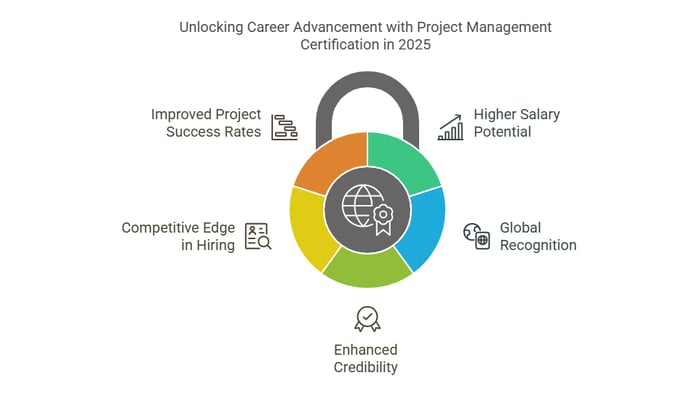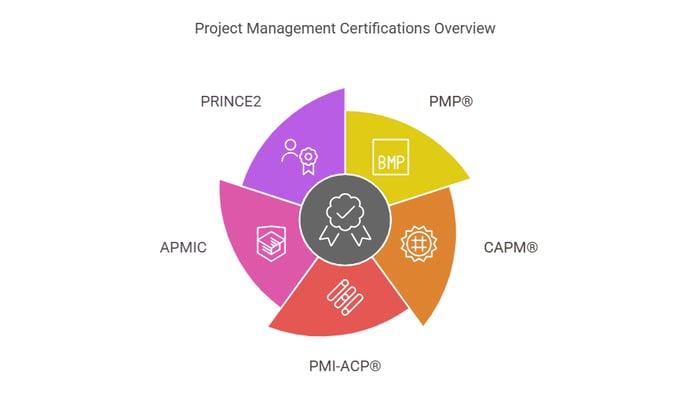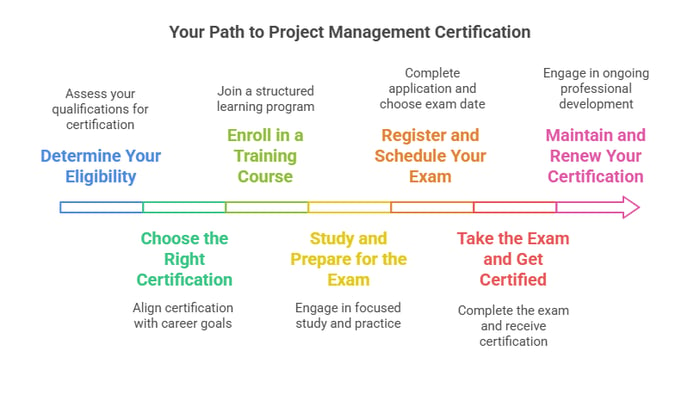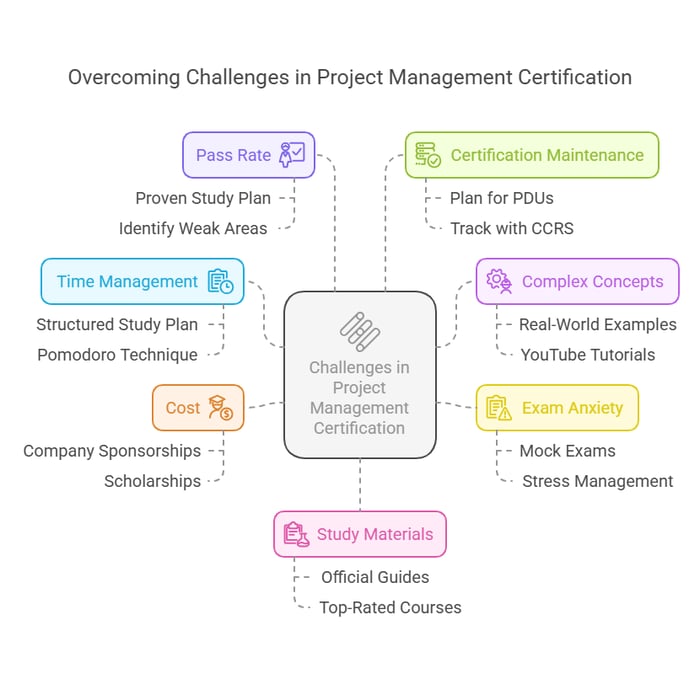Table of Contents
- Introduction: Why Project Managers Are the Real Superheroes
- Why Professional Project Management Certification Matters in 2025?
- Top Project Management Certifications in 2025
- How to Choose the Right Certification
- Steps to Get a Project Management Certification
- Common Challenges in Earning a Project Management Certification & How to Overcome Them
- 10 Less Commonly Known Facts About Project Management Certifications
- Final Thoughts: The Best Place to Get Certified
- FAQs
Introduction: Why Project Managers Are the Real Superheroes
Ever feel like project managers are the real-life Avengers of the corporate world? They juggle deadlines like Hawkeye, strategize like Iron Man, and somehow manage to keep the chaos at bay like Captain America. If you've ever led a team through the wilderness of tight budgets, stakeholder demands, and looming deadlines, you know exactly what I mean. But even superheroes need credentials, and that’s where professional project management certifications come in. Whether you’re looking to climb the corporate ladder, boost your salary, or just prove that you’re the mastermind behind those on-time project deliveries, getting certified is your next power move.
In this guide, we’ll cover everything you need to know about professional project management certifications in 2025—what they are, why they matter, and which one is right for you. Plus, we’ll dig into lesser-known facts and insights that even seasoned project managers might not know. Let’s dive in!
Why Professional Project Management Certification Matters in 2025?
Project management is evolving faster than ever. Companies now demand highly skilled professionals who can navigate the complexities of AI-driven workflows, remote teams, and sustainability-focused projects. Here’s why getting a professional project management certification is a game-changer in 2025:

1. Higher Salary Potential 💰
Certified project managers earn up to 22% more than non-certified ones, according to PMI’s salary survey. With the increasing demand for skilled project managers, this figure is expected to rise in 2025.
2. Global Recognition 🌍
Certifications like PMP, PRINCE2, and APMIC are recognized worldwide, allowing you to work across industries and countries.
3. Enhanced Credibility 📜
A project management certification is more than a badge—it's proof that you know how to lead projects effectively and apply best practices.
4. Competitive Edge in Hiring 🏆
Many job descriptions now require certification as a basic qualification. If you don’t have one, you might not even get past the first round of screening.
5. Improved Project Success Rates ✅
Studies show that companies with certified project managers complete 85% of projects on time and within budget, compared to just 50% for companies without certified PMs.
Top Project Management Certifications in 2025
With so many project management certifications available, it’s crucial to pick the right one for your career goals. Below are the most respected and widely recognized certifications in 2025:
1. Project Management Professional (PMP®)
Ideal for: Experienced project managers
Focus: Predictive, agile, and hybrid approaches
Cost: Around $555 (non-PMI members)
Key Benefit: Recognized as the gold standard in project management
2. Certified Associate in Project Management (CAPM®)
Ideal for: Beginners
Focus: PMBOK framework and project fundamentals
Cost: ~$300
Key Benefit: Great entry-level certification
3. Agile Certified Practitioner (PMI-ACP®)
Ideal for: Agile project managers
Focus: Agile frameworks like Scrum and Kanban
Cost: ~$435
Key Benefit: High demand in software and IT industries
4. Advanced Project Management Integrative Certification (APMIC)
Ideal for: All levels (beginner to advanced)
Focus: Modular learning across industries
Cost: Varies by modules
Key Benefit: 400+ modules covering specialized topics like AI in project management
5. PRINCE2 Foundation and Practitioner
Ideal for: Process-driven project managers
Focus: Methodical project management
Cost: ~$900–$1,000
Key Benefit: Popular in the UK and Europe

How to Choose the Right Certification
To select the best certification, consider:
Your Experience Level: CAPM for beginners, PMP for seasoned professionals.
Industry: Agile certifications for tech roles, PRINCE2 for structured environments.
Budget & Time: Some require rigorous preparation and higher fees.
Career Goals: If you want to specialize, go for modular certifications like APMIC.
Learning Formats for Professional Project Management Certification
To accommodate different learning styles and schedules, project management certifications offer various formats:
🎓 Self-Paced Online Modules
Perfect for busy professionals, online modules allow learners to study at their own pace. Many programs offer interactive video lessons, quizzes, and simulated exams to reinforce learning.
👩🏫 Instructor-Led Classes
These structured programs provide direct access to industry experts, allowing real-time interaction, Q&A sessions, and in-depth discussions. Ideal for those who prefer guided learning with an experienced mentor.
🚀 Bootcamps
For those looking to fast-track their certification, intensive bootcamps compress months of training into just a few weeks. These programs often include hands-on case studies and rapid exam preparation.
🏢 Corporate Training Programs
Many organizations invest in project management training for their teams. Corporate-sponsored programs ensure employees receive role-specific training tailored to the company’s projects and methodologies.
🔬 Case-Based Learning
Certifications like APMIC incorporate real-world project case studies, ensuring that learners can apply theoretical knowledge to practical situations. This approach bridges the gap between theory and execution.
🎮 Gamification & Simulated Environments
Some certification programs now include gamified learning experiences, where participants manage simulated projects with real-time feedback. This interactive approach enhances engagement and problem-solving skills.
Pro Tip: Choosing the right certification depends on various factors like experience, industry, and career goals. Explore the best project management certification options for 2025 to find the perfect fit for your career.
Steps to Get a Project Management Certification
Earning a project management certification is a structured process that requires careful planning and preparation. Whether you’re aiming for the PMP (Project Management Professional), CAPM (Certified Associate in Project Management), PRINCE2, or Agile certifications, following these steps will help you achieve your goal efficiently.

1. Determine Your Eligibility
Before selecting a certification, check if you meet the eligibility criteria. Each certification has specific requirements related to education and experience:
PMP Certification (Project Management Institute - PMI)
- A four-year degree + 36 months of project management experience + 35 hours of project management training OR
- A high school diploma (or associate’s degree) + 60 months of experience + 35 hours of training
CAPM Certification (Entry-level)
- High school diploma or equivalent
- 23 hours of formal project management education
PRINCE2 Certification
- No prerequisites for PRINCE2 Foundation
- PRINCE2 Practitioner requires PRINCE2 Foundation or an equivalent certification
Agile Certifications (PMI-ACP, CSM, SAFe Agilist, etc.)
- Most Agile certifications require basic knowledge of Agile methodologies
- Some require experience in Agile projects
2. Choose the Right Certification for Your Career Goals
Different certifications are suited for different industries and career paths:
- PMP → Best for experienced professionals managing large-scale projects
- CAPM → Ideal for beginners entering the project management field
- PRINCE2 → Preferred in Europe and Commonwealth countries
- Agile Certifications (PMI-ACP, CSM, SAFe Agilist) → Ideal for professionals working in Agile environments
- Six Sigma (Green Belt, Black Belt) → Best for process improvement and quality management
3. Enroll in a Training Course
Once you choose the right certification, enroll in a formal training course.
- Self-Paced Online Courses – Udemy, Coursera, LinkedIn Learning
- Instructor-Led Online Classes – PMI Training, Simplilearn, Master of Project Academy
- Bootcamps & Workshops – Offered by PMI, Axelos, and other training institutes
Training courses provide structured learning and exam preparation materials, including mock exams, case studies, and sample questions.
4. Study and Prepare for the Exam
- Read the Official Guide (e.g., PMBOK Guide for PMP, PRINCE2 Manual)
- Use Online Resources (Blogs, YouTube tutorials, podcasts)
- Practice with Mock Exams (Helps with time management and question formats)
- Join Study Groups (Reddit, LinkedIn, PMI local chapters)
5. Register and Schedule Your Exam
- Create an account on the official certification provider’s website (e.g., PMI.org for PMP)
- Submit your application and required documents
- Pay the exam fee (Check for discounts if you're a PMI member)
- Select an exam date and choose between online proctored or test center-based exams
6. Take the Exam and Get Certified
On exam day:
- Ensure a quiet environment if taking an online exam
- Use a time management strategy (e.g., mark difficult questions for review)
- Stay calm and confident
Upon passing the exam, you will receive your certification and digital badge, proving your expertise in project management.
7. Maintain and Renew Your Certification
Many certifications require renewal after a few years:
- PMP: Earn 60 Professional Development Units (PDUs) every 3 years
- PRINCE2 Practitioner: Renew every 3 years
- PMI-ACP & Agile Certifications: Renew every 3 years with PDUs
Regularly attending project management webinars, workshops, and taking advanced courses can help maintain your certification. For professionals in the tech industry, obtaining the right certification is crucial. Check out the best IT project management certification to advance your career in 2025.
Common Challenges in Earning a Project Management Certification & How to Overcome Them
While earning a Project Management Certification is a valuable career move, the journey comes with several challenges. Here’s a breakdown of the most common challenges and how to overcome them:

1. Time Management Issues
Challenge: Many professionals struggle to find time for studying due to full-time jobs, family responsibilities, and other commitments.
Solution:
✅ Create a structured study plan and set aside 1-2 hours per day
✅ Use Pomodoro techniques (25-30 minutes of focused study, 5-minute break)
✅ Enroll in self-paced online courses that allow flexible learning
2. Understanding Complex Concepts
Challenge: PMP and other project management certifications involve technical concepts like Earned Value Management (EVM), Critical Path Method (CPM), and Risk Analysis, which can be difficult for some candidates.
Solution:
✅ Use real-world examples to understand abstract concepts
✅ Watch YouTube tutorials and take interactive quizzes
✅ Participate in study groups and discussion forums to clarify doubts
3. Exam Anxiety and Stress
Challenge: Many candidates feel overwhelmed by the exam format, difficulty level, and pressure to pass on the first attempt.
Solution:
✅ Take multiple mock exams to build confidence
✅ Practice stress management techniques (deep breathing, meditation)
✅ Familiarize yourself with the exam environment by using official exam simulators
4. High Cost of Certification
Challenge: The cost of PMP and other project management certifications can range from $300 to $1,000, which might be unaffordable for some professionals.
Solution:
✅ Look for company sponsorships (Many employers reimburse certification fees)
✅ Apply for scholarships or discounts (PMI members get discounts on exams)
✅ Use free resources for preparation before enrolling in paid courses
5. Low Pass Rate and Risk of Failure
Challenge: The PMP exam has a low pass rate (~50-60%), making it challenging for first-time test-takers.
Solution:
✅ Follow a proven study plan (Read the PMBOK Guide + practice 1,000+ mock questions)
✅ Identify weak areas using exam simulations and focus on improving them
✅ Use spaced repetition (review difficult concepts multiple times over weeks)
6. Keeping Certification Active
Challenge: Many professionals forget to renew their certifications, which leads to credential expiration and extra costs for retaking exams.
Solution:
✅ Plan for Professional Development Units (PDUs) every year (webinars, online courses)
✅ Subscribe to PMI newsletters for renewal reminders
✅ Keep track of PDUs with PMI’s CCRS (Continuing Certification Requirements System)
7. Finding the Right Study Materials
Challenge: With thousands of study guides, courses, and prep books available, candidates often struggle to choose the right materials.
Solution:
✅ Follow official guides like PMBOK (PMP) and PRINCE2 manuals
✅ Use top-rated courses (Rita Mulcahy’s PMP Prep, Andrew Ramdayal’s Udemy Course)
✅ Join LinkedIn and Reddit study groups to get recommendations
10 Less Commonly Known Facts About Project Management Certifications
1. PMP Certification Increases Salary by 22% - According to the Project Management Institute (PMI) Salary Survey, PMP-certified professionals earn 22% more than non-certified project managers. PMI
2. Over 1.5 Million PMP-Certified Professionals Worldwide - As of 2025, there are more than 1.5 million PMP-certified professionals globally, making it one of the most recognized certifications in the industry. PMI
3. Demand for Project Managers is Expected to Grow by 33% by 2030 - The demand for project management roles is expected to increase by 33% by 2030, with over 25 million new jobs projected worldwide.
4. 80% of High-Performing Projects Have Certified Project Managers - Research shows that 80% of successful projects are led by certified project managers, proving the value of professional certification.
5. Project Failure Costs Companies Billions Annually - According to a report, $1 million is wasted every 20 seconds due to poor project management, amounting to $2 trillion annually in losses worldwide. PwC
6. Agile Project Management is Now More Popular Than Traditional Methods - Over 71% of companies now use Agile approaches for project management, making Agile-related certifications like PMI-ACP highly valuable. Scrum Alliance
7. PRINCE2 is the Preferred Certification in Europe and Australia - PRINCE2 is the leading project management certification in Europe, Australia, and the UK, while PMP is dominant in North America and Asia. AXELOS
8. 58% of Companies Require Certification for Project Management Roles- More than 58% of job postings for project managers specifically mention PMP or another professional certification as a requirement. Glassdoor
9. Certified Project Managers Improve Success Rates by 35% - Organizations with certified project managers have a 35% higher success rate in delivering projects on time and within budget. PMI
10. Project Management Certifications Require Ongoing Education - Most certifications, including PMP, require renewal every three years through continuing education or Professional Development Units (PDUs).
For an in-depth understanding of project management best practices, you can download the PMI Project Management Professional (PMP) Handbook, which outlines certification requirements, exam details, and study tips.
Final Thoughts: The Best Place to Get Certified
If you’re serious about boosting your career with the best project management certifications, check out APMIC. With its industry-leading curriculum and modular learning approach, it’s the ultimate way to future-proof your project management skills.
FAQs
What is the best project management certification in 2025?
PMP remains the top choice for most professionals, but APMIC is rising fast due to its modular, industry-focused approach.
Is PMP worth it in 2025?
Yes! PMP-certified professionals earn significantly more and have better job opportunities.
Can I get certified without experience?
Yes, CAPM and entry-level APMIC modules are designed for beginners.
How long does it take to prepare for a certification?
CAPM takes 4-8 weeks, while PMP typically requires 2-4 months of study.
Are project management certifications expensive?
Costs range from $300 to over $1,000, but many employers reimburse fees.
What’s the difference between PMP and PRINCE2?
PMP is more flexible, while PRINCE2 is process-driven.
Do project management certifications expire?
Yes, most require renewal every 3 years with continuing education credits.
What industries value project management certifications?
IT, healthcare, finance, construction, and even government sectors prioritize certified project managers.





